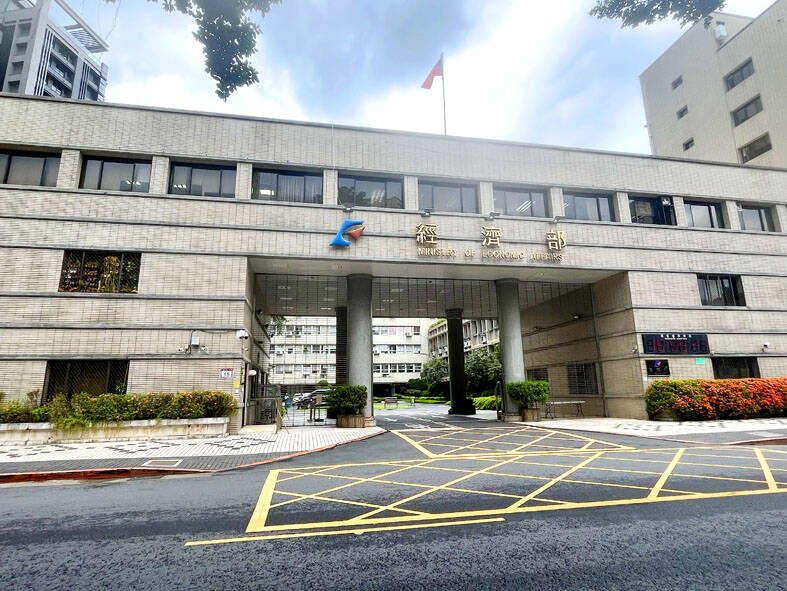Amendments passed by the Legislative Yuan in May to impose harsher punishment for economic espionage took effect yesterday.
The changes to the National Security Act (國家安全法) and the Act Governing Relations Between the People of the Taiwan Area and the Mainland Area (臺灣地區與大陸地區人民關係條例) were made to protect Taiwan’s core technologies.
The amendment to the latter act prohibits Chinese companies or Chinese-funded entities based outside China from engaging in business activities in Taiwan without government approval.

Photo: Liao Chia-ning, Taipei Times
Offenders could face up to three years in prison and fines of up to NT$15 million (US$481,232). Previously, maximum penalties were one year in prison and NT$150,000.
Additionally, those who allow Chinese-funded businesses to use their name to operate in Taiwan could face fines ranging from NT$120,000 to NT$2.5 million under the new amendments.
The law also stipulates that people commissioned by central agencies to engage in businesses involving Taiwan’s core technologies would need government approval to travel to China.
The approval process is to be drafted by the National Science and Technology Council, which is communicating with local industries and is to announce the related regulations once they are ready, sources said.
To correspond with the amendment, the Ministry of Economic Affairs proposed a change to the Regulations Governing the Permission of Establishing Branches or Agencies in Taiwan by Commercial Enterprise in the Mainland Area (大陸地區之營利事業在台設立分公司或辦事處許可辦法) and the passed amendment was announced on Thursday.
The regulationd have been renamed the Regulations Governing the Permission of Establishing Branches or Representative Offices in Taiwan by a Commercial Enterprise in the Mainland Area or a Commercial Enterprise It Invested In a Third Area (大陸地區之營利事業或其於第三地區投資之營利事業在台設立分公司或辦事處許可辦法).
Branches or offices set up directly by Chinese-funded businesses or indirectly through an entity outside of Taiwan or China would be considered “Chinese-funded businesses,” the ministry said.
Additionally, companies outside of Taiwan or China that receive more than 30 percent of their funding from Chinese businesses, or in which Chinese businesses hold more than 30 percent of the shares, would be considered “Chinese-funded businesses,” it added.
The regulations also stipulate that such branches or offices are banned from engaging in research and development activities to prevent China from poaching talent from Taiwan and protect national security.
The amended regulations limit such business activities to collecting, organizing and analyzing data related to market surveys.
Companies and offices that have not completed registration in Taiwan cannot conduct business in the country, it says.

MORE VISITORS: The Tourism Administration said that it is seeing positive prospects in its efforts to expand the tourism market in North America and Europe Taiwan has been ranked as the cheapest place in the world to travel to this year, based on a list recommended by NerdWallet. The San Francisco-based personal finance company said that Taiwan topped the list of 16 nations it chose for budget travelers because US tourists do not need visas and travelers can easily have a good meal for less than US$10. A bus ride in Taipei costs just under US$0.50, while subway rides start at US$0.60, the firm said, adding that public transportation in Taiwan is easy to navigate. The firm also called Taiwan a “food lover’s paradise,” citing inexpensive breakfast stalls

US PUBLICATION: The results indicated a change in attitude after a 2023 survey showed 55 percent supported full-scale war to achieve unification, the report said More than half of Chinese were against the use of force to unify with Taiwan under any circumstances, a survey conducted by the Atlanta, Georgia-based Carter Center and Emory University found. The survey results, which were released on Wednesday in a report titled “Sovereignty, Security, & US-China Relations: Chinese Public Opinion,” showed that 55.1 percent of respondents agreed or somewhat agreed that “the Taiwan problem should not be resolved using force under any circumstances,” while 24.5 percent “strongly” or “somewhat” disagreed with the statement. The results indicated a change in attitude after a survey published in “Assessing Public Support for (Non)Peaceful Unification

The CIA has a message for Chinese government officials worried about their place in Chinese President Xi Jinping’s (習近平) government: Come work with us. The agency released two Mandarin-language videos on social media on Thursday inviting disgruntled officials to contact the CIA. The recruitment videos posted on YouTube and X racked up more than 5 million views combined in their first day. The outreach comes as CIA Director John Ratcliffe has vowed to boost the agency’s use of intelligence from human sources and its focus on China, which has recently targeted US officials with its own espionage operations. The videos are “aimed at

Four former Hong Kong opposition lawmakers jailed in the territory’s largest national security case were released yesterday after more than four years in prison, the first among dozens convicted last year to regain their freedom. Former legislators Claudia Mo (毛孟靜), Jeremy Tam (譚文豪), Kwok Ka-ki (郭家麒) and Gary Fan (范國威) were part of a group of 47 public figures — including some of Hong Kong’s best-known democracy advocates — who were charged with subversion in 2021 for holding an informal primary election. The case fell under a National Security Law imposed on the territory by Beijng, and drew international condemnation and warnings